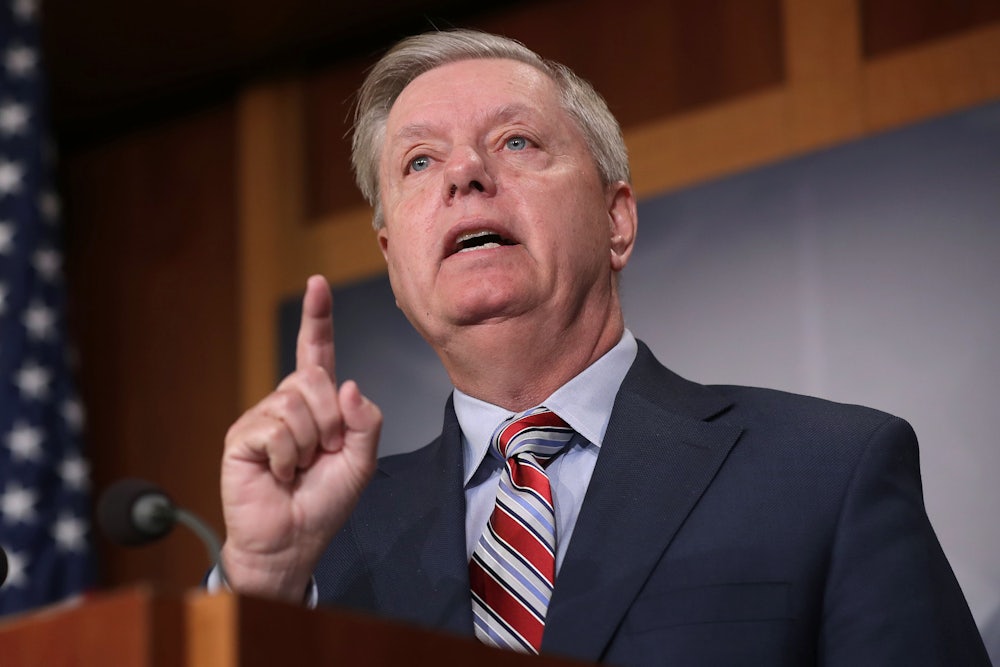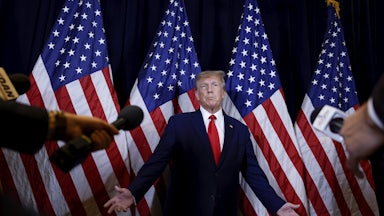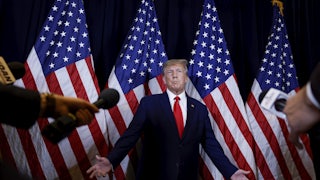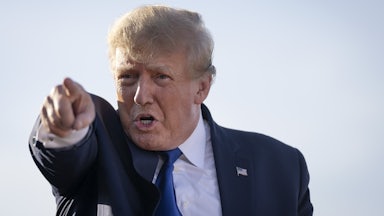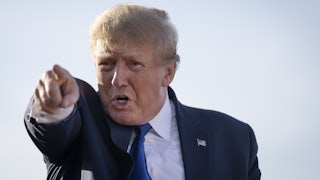Like many other conservatives, South Carolina Senator Lindsey Graham made time this week to castigate Manhattan District Attorney Alvin Bragg for preparing to indict former President Donald Trump in the coming days or weeks. (According to Trump, that is—no such indictment has appeared.) “You’re lucky if you don’t get mugged on the way to where you’re going. Is this really the most important thing going on in Manhattan?” Graham asked an audience in Florida over the weekend. “I think this is an effort that’s ongoing, never ending, to destroy Donald Trump, everything around Donald Trump.”
Then he offered some legal advice for the former president, as it were. “If I were President Trump, I’d take this all the way to the dang Supreme Court,” he added.
That might not be as bad an idea as it sounds. The Supreme Court, as I’ve written before, hasn’t been as friendly to Trump as he would prefer. But this particular case, with its campaign finance implications and tenuous prosecutorial theories, may fall within its interests more clearly than others.
It’s worth noting at the outset that we don’t know the exact charges that may be filed against Trump. Reporting by major news outlets suggests that Bragg’s office is focusing on hush payments made to adult film star Stormy Daniels for an alleged affair she had with Trump many, many aeons ago. That office has investigated Trump for other offenses as well over the years, and the full scope of potential charges is unclear.
Michael Cohen, Trump’s former legal fixer, pleaded guilty to federal campaign finance charges in 2018 for paying $130,000 to not disclose the relationship during the 2016 presidential campaign. Trump subsequently reimbursed Cohen for the payments. Trump was not charged by federal prosecutors for his role in the scheme. Cohen pleaded guilty to that offense and other tax- and fraud-related charges at the time, avoiding a trial and the opportunity to contest the charges.
Why federal campaign finance charges for Cohen? Hush-money payments are generally not illegal. But federal prosecutors argued that the payments amounted to an in-kind donation to Trump’s presidential campaign since they directly benefited his electoral chances. Accordingly, Cohen was charged with exceeding the $25,000 donation limit for individual candidates.
Local prosecutors can’t charge defendants with federal crimes, so the Manhattan district attorney’s theory of the case works a bit differently. The New York Times reported that the case hinges on two parallel offenses. The first offense would be falsifying business records, which Cohen and Trump allegedly did to cover up both the Daniels payment by Cohen and Trump’s later payment to reimburse him.
Under New York law, falsifying business records is a misdemeanor unless it occurred in furtherance of another criminal act. The second offense would be violating New York’s state-level campaign finance laws. By connecting the falsified business records charge to the campaign finance offense, Bragg’s office can charge the former as a felony instead of a misdemeanor. Altogether, this platter of crimes carries a potential maximum sentence of four years in prison.
Some legal commentators, even those who are otherwise disinclined to favor Trump’s view of the law and the Constitution, have expressed doubts about this strategy. Election law expert Rick Hasen wrote last week that the underlying legal theory was “difficult” and that it would be “ill-advised” to pursue charges for it. “It is going to turn on Trump’s state of mind in a case that federal prosecutors looked at and passed on,” he noted. “It seems like a risky move to go after Trump on an uncertain legal theory that requires bootstrapping two crimes for something that might not even merit jail time.”
David French, a conservative lawyer and commentator who frequently criticizes Trump, had similar misgivings. “It rightly said that although he is accused of making hush-money payments, the legal theory that it could support a felony charge ‘has largely gone untested’ and ‘would therefore make for a risky legal case against any defendant,’” he wrote in a Times column, referring to press accounts of the potential charges. “If that’s the case, then don’t file the charge.”
Bragg previously came under intense criticism when, shortly after taking office at the beginning of last year, he declined to continue pursuing potential charges against Trump for allegedly fabricating his annual financial statements and misleading banks about the values of his various properties. Two senior prosecutors resigned in protests over the decision, which had ended a three-year investigation into what was once seen as the most perilous of Trump’s legal woes. The New York attorney general’s office filed civil charges against the Trump Organization based on the investigation’s findings in a lawsuit last year that could, if successful, effectively dismantle Trump’s real estate empire.
The Supreme Court, for its part, hasn’t been too friendly to Donald Trump over the years, Sure, it’s ruled in favor of some of his policies, such as the Muslim travel ban. It’s occasionally handed him a mixed legal victory when blocking Congress’s efforts to scrutinize him more closely. But there are few signs, if any, that a majority of the justices would do for Trump what it wouldn’t do for another conservative president.
But that trend cuts both ways. In recent years, the Supreme Court has been deeply skeptical of both public corruption cases and the breadth of federal campaign finance laws. In 2016, the court unanimously narrowed a federal bribery statute in McDonnell v. Virginia and upheld former Virginia Governor Bob McDonnell’s claim that he had not broken any laws when doing unofficial favors for people from whom he had received lavish gifts. That ruling contributed to the unraveling of other bribery-related cases, including a high-profile prosecution of New Jersey Senator Bob Menendez for receiving and giving a stream of favors to a campaign donor.
And on campaign finance issues, the court has trended toward using the First Amendment to defang their potential bite. In Citizens United v. Federal Election Commission, the court struck down key portions of the Bipartisan Campaign Financial Reform Act and made it easier for donors to funnel their contributions through independent expenditures. Just last year, the court sided with Texas Senator Ted Cruz in a test case that aimed to overturn a provision dealing with personal loans to a political campaign, once again rejecting concerns about the appearance of corruption.
Those rulings, taken together, suggest that the court will generally be skeptical when prosecutors bring cases against politicians where campaign finance laws are concerned. This is not necessarily because the justices love bribery and corruption and want to see more of it. They are instead concerned about the First Amendment implications of using those laws against public officials. And while Trump was not in office when he made the hush-money payments, their proximity to his presidency could draw some scrutiny. It’s far too soon to tell whether the courts will embrace Bragg’s theory, or even its full contours. But Lindsey Graham is correct to believe that there is good reason to wonder if the courts—especially the Supreme Court, if it comes to that—will be willing to countenance it.
